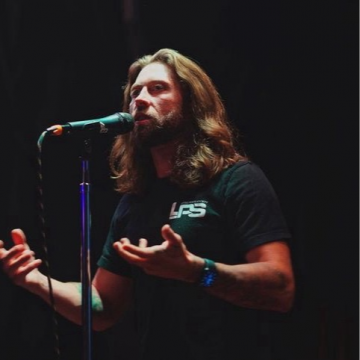A pigeon from my editor flew to my window on Monday afternoon, with my first mission lodged in her beak. I let her in and she flew in magnificent circles around my room before delivering the message into my open palms. The creature cooed as I opened my gift with the fervor and vehemence of the mighty lioness ravaging the delicate gazelle. The pigeon cocked her head at me, and I knew what she wanted. Everyone expects a tip these days. I coughed up my gratuity in peanuts, seeds and even some raisins. She thanked me with a delicious whistle before beginning her journey home.

The mission’s instructions were to attend Poetry Unlocked, a monthly meeting of the poetically inclined in the Fox River area. The group’s church is typically ACOCA Coffee, after hours, on the second Monday of the month. I fancied it to be a sort of secret society of writers, so it was only appropriate for me to adorn myself in my special black turtleneck.
Operation Poetry Unlocked at ACOCA Coffee required the agent to embark on a journey of 0.8 miles. The trek was treacherous, with winds winding around me and nearly bringing me down. I persevered, with my trusty Sony Zx Wired On-Ear Headphones providing me with melodious accompaniment in the form of Patti Smith’s “Constantine’s Dream” — “Art the great material gift of man!” I was ready to drench myself in my mission. I entered the symposium, gaining awareness of my juvenility. The seniority of the majority of my compatriots was immediately evident. I was delighted, for any opportunity to engage with the wisdom that comes with age is precious, and should be savored.
I ordered my americano and sat down at a table at the edge of the gathering, ready to observe. I’d hardly set up camp when the group next to me invited me to sit with them. I obliged, relocating to a new home. The ensuing conversation came at me from all angles. Introductions, names, business cards, cough drops and bracelets bounced around the table. Everyone knew each other, and made genuine efforts to get to know me. The man who had invited me to join them asked what I had in my notebook. I told him that the pages of my notebook are mostly poems, and with a healthy amount of peer pressure I wrote my name on the open mic sign up sheet. This particular installment of Poetry Unlocked featured two specific poets, who would read sets of poems for the first half of the evening and be followed by a free-for-all where any attendee could make an offering.

North Fond Du Lac’s poet laureate Jeffery McAndrew commenced the evening. He preached of authenticity, mothers, politics, aging and poetry itself. It’s always an honor to hear a poet recite their own work. Hidden truths are clearly communicated through the cracks in someone’s voice or the slight smile you can hear as they speak. His work crept into my head, in conversation with itself, comparing the written word and authenticity. Poetry is an attempt at expressing yourself authentically, and inauthenticity is rarely inspiring. The truth always shines through, clear and clean, no matter how confusing and filthy it is.
Alex Schotten followed. The 30-year-old author of “How I Learned to Love from Heroin” and “Tomorrow Stole Today” was raised in Appleton and currently resides in Tucson, Arizona. His poems are testimonies of his struggles with addiction, love and trauma. As he spoke, a sink hole in my stomach collapsed into my abdomen. I couldn’t imagine trying to write about his work. The intensity with which he spoke tethered the room to his every word. At the same time, he was incredibly down to earth, and funny. He used the word “yap” to refer to his earth-rattling poetry, a charming but ridiculous description of his set.
The designated readings concluded and the free-for-all ensued. The roster had grown into quite the document, so a request was issued for moderation in the quantity of poems we each read. We couldn’t be there all night, but I was starting to wish that we could be. One by one my fellow audience members ventured around the couches and up to the microphone and delivered ingenious compositions. I began to chuckle to myself at the sheer buffoonery I hear so frequently on campus: “Appleton is boring,” “Wisconsin is boring” and “nothing ever happens here.” Yet there I was, at the archetypal meeting of the poets. There is nowhere in the world where humans live that is not a center for fierce creativity.
A poet at my table, James Hamilton, dragged a chair to the middle of the room. He fashioned himself a stage by hopping atop it, momentarily declaring himself the artistic dictator of the event. He whipped out his manifesto — a laminated scroll so long that when he unrolled it, it hit the ground with a clatter. His words tore through American politics and modern problems with a sort of ancient rage. No need for a microphone. The declaration was fast and slow, with creative and intricate wordplay and raw, untamed anger.
Eventually my name was called, and I waddled up to the microphone with my journal. I looked down at my infected little wound of a poem, decorated with Wite-Out and scribbles. My voice shook a little as I read it, but pretty soon it was over and I was humored with some applause. What a kind group of artists; humans really are my favorite animals. On my way home I had a little more pep in my step. How can I be more authentic? How can I create more, to honor the experience I just had? Be yourself in the name of art. When the truth is spoken, poetry is the result. I’d entered ACOCA ready to observe, but was able to contribute a morsel of honesty to a group of poets: a true honor.

